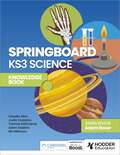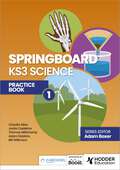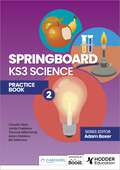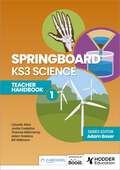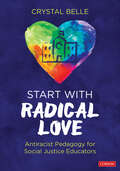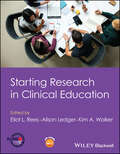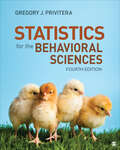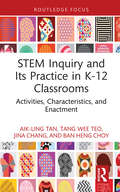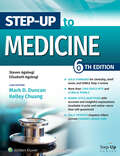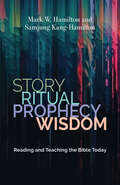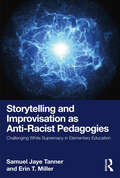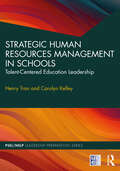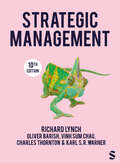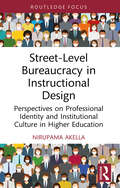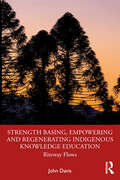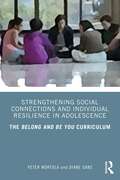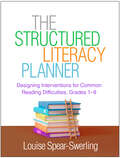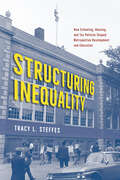- Table View
- List View
Springboard: KS3 Science Knowledge Book
by Adam Robbins Claudia Allan Jovita Castelino Thomas Millichamp Bill WilkinsonCover all the knowledge that students need to know for Key Stage 3 Science in one book.Powered by cognitive science principles, this knowledge-rich book enables students to keep revisiting content, see the links between the sciences, and develop deeper understanding.Our expert author team have used their extensive experience of research-informed teaching practice to create this carefully thought-out Knowledge Book. It will establish and embed the key scientific knowledge and skills that students need to succeed at KS3, ensuring they feel enthused and confident about progressing to GCSE. > Take a new approach to KS3 Science. This Knowledge Book sequences the National Curriculum with unprecedented precision, enabling students to progress through KS3 with ease and fluency.> Reduce cognitive load. Every topic is explained through a succinct and focused table of questions and answers, which captures all the essential knowledge that pupils need.> Use visual aids to further understanding. Complex topics are paired with annotated diagrams, and worked examples are provided to illustrate key skills and calculations in further detail.> Strengthen scientific skills throughout. 'Working Scientifically' pages integrate principles and concepts into students' understanding, using questions and answers, diagrams, tables and more.
Springboard: KS3 Science Knowledge Book
by Adam Robbins Claudia Allan Jovita Castelino Thomas Millichamp Bill WilkinsonCover all the knowledge that students need to know for Key Stage 3 Science in one book.Powered by cognitive science principles, this knowledge-rich book enables students to keep revisiting content, see the links between the sciences, and develop deeper understanding.Our expert author team have used their extensive experience of research-informed teaching practice to create this carefully thought-out Knowledge Book. It will establish and embed the key scientific knowledge and skills that students need to succeed at KS3, ensuring they feel enthused and confident about progressing to GCSE. > Take a new approach to KS3 Science. This Knowledge Book sequences the National Curriculum with unprecedented precision, enabling students to progress through KS3 with ease and fluency.> Reduce cognitive load. Every topic is explained through a succinct and focused table of questions and answers, which captures all the essential knowledge that pupils need.> Use visual aids to further understanding. Complex topics are paired with annotated diagrams, and worked examples are provided to illustrate key skills and calculations in further detail.> Strengthen scientific skills throughout. 'Working Scientifically' pages integrate principles and concepts into students' understanding, using questions and answers, diagrams, tables and more.
Springboard: KS3 Science Practice Book 1
by Adam Boxer Jovita Castelino Claudia Allan Adam Robbins Thomas Millichamp Bill WilkinsonProvide all the independent practice needed for your Springboard Science course with over 1000 questions in each Practice Book.Designed to be used alongside our Knowledge Book, our Practice Books provide shed loads of practice (SLOP) for students to consolidate, apply and extend the knowledge that they have learnt.With decades of teaching experience and extensive knowledge of applying cognitive science in the classroom, you can trust our author team to have created carefully crafted and varied questions for independent practice.> Improve students' long-term retention. Spacing is built in throughout this Practice Book, improving retention over time.> Highlight connections between topics and Sciences. Interleaving of content encourages students to recognise and focus on the connections, similarities and differences across science, enabling them to reflect on their learning in more depth.> Build confidence in the key skills. Question sets include coverage of the key mathematical and working scientifically skills that students need to understand, ensuring that this knowledge is embedded throughout their independent practice.> Support every student. Links to the relevant worked examples in the Knowledge Book are highlighted throughout each unit for easy reference.> Prepare for the next step. Questions increase in difficulty throughout each topic, enabling students to progress through the KS3 curriculum and prepare for KS4 and beyond. Answers are available online for free, and also embedded into the lesson presentations in our Boost digital teaching and learning resources for easy in-class independent practice review.
Springboard: KS3 Science Practice Book 1
by Adam Boxer Jovita Castelino Claudia Allan Adam Robbins Thomas Millichamp Bill WilkinsonProvide all the independent practice needed for your Springboard Science course with over 1000 questions in each Practice Book.Designed to be used alongside our Knowledge Book, our Practice Books provide shed loads of practice (SLOP) for students to consolidate, apply and extend the knowledge that they have learnt.With decades of teaching experience and extensive knowledge of applying cognitive science in the classroom, you can trust our author team to have created carefully crafted and varied questions for independent practice.> Improve students' long-term retention. Spacing is built in throughout this Practice Book, improving retention over time.> Highlight connections between topics and Sciences. Interleaving of content encourages students to recognise and focus on the connections, similarities and differences across science, enabling them to reflect on their learning in more depth.> Build confidence in the key skills. Question sets include coverage of the key mathematical and working scientifically skills that students need to understand, ensuring that this knowledge is embedded throughout their independent practice.> Support every student. Links to the relevant worked examples in the Knowledge Book are highlighted throughout each unit for easy reference.> Prepare for the next step. Questions increase in difficulty throughout each topic, enabling students to progress through the KS3 curriculum and prepare for KS4 and beyond. Answers are available online for free, and also embedded into the lesson presentations in our Boost digital teaching and learning resources for easy in-class independent practice review.
Springboard: KS3 Science Practice Book 2
by Adam Boxer Jovita Castelino Claudia Allan Adam Robbins Thomas Millichamp Bill WilkinsonProvide all the independent practice needed for your Springboard Science course with over 1000 questions in each Practice Book.Designed to be used alongside our Knowledge Book, our Practice Books provide shed loads of practice (SLOP) for students to consolidate, apply and extend the knowledge that they have learnt.With decades of teaching experience and extensive knowledge of applying cognitive science in the classroom, you can trust our author team to have created carefully crafted and varied questions for independent practice.> Improve students' long-term retention. Spacing is built in throughout this Practice Book, improving retention over time.> Highlight connections between topics and Sciences. Interleaving of content encourages students to recognise and focus on the connections, similarities and differences across science, enabling them to reflect on their learning in more depth.> Build confidence in the key skills. Question sets include coverage of the key mathematical and working scientifically skills that students need to understand, ensuring that this knowledge is embedded throughout their independent practice.> Support every student. Links to the relevant worked examples in the Knowledge Book are highlighted throughout each unit for easy reference.> Prepare for the next step. Questions increase in difficulty throughout each topic, enabling students to progress through the KS3 curriculum and prepare for KS4 and beyond. Answers are available online for free, and also embedded into the lesson presentations in our Boost digital teaching and learning resources for easy in-class independent practice review.
Springboard: KS3 Science Practice Book 2
by Adam Boxer Jovita Castelino Claudia Allan Adam Robbins Thomas Millichamp Bill WilkinsonProvide all the independent practice needed for your Springboard Science course with over 1000 questions in each Practice Book.Designed to be used alongside our Knowledge Book, our Practice Books provide shed loads of practice (SLOP) for students to consolidate, apply and extend the knowledge that they have learnt.With decades of teaching experience and extensive knowledge of applying cognitive science in the classroom, you can trust our author team to have created carefully crafted and varied questions for independent practice.> Improve students' long-term retention. Spacing is built in throughout this Practice Book, improving retention over time.> Highlight connections between topics and Sciences. Interleaving of content encourages students to recognise and focus on the connections, similarities and differences across science, enabling them to reflect on their learning in more depth.> Build confidence in the key skills. Question sets include coverage of the key mathematical and working scientifically skills that students need to understand, ensuring that this knowledge is embedded throughout their independent practice.> Support every student. Links to the relevant worked examples in the Knowledge Book are highlighted throughout each unit for easy reference.> Prepare for the next step. Questions increase in difficulty throughout each topic, enabling students to progress through the KS3 curriculum and prepare for KS4 and beyond. Answers are available online for free, and also embedded into the lesson presentations in our Boost digital teaching and learning resources for easy in-class independent practice review.
Springboard: KS3 Science Teacher Handbook 1
by Adam Boxer Adam Robbins Claudia Allan Jovita Castelino Thomas Millichamp Bill WilkinsonDeliver the Springboard Science course confidently with this workload-friendly approach to a knowledge-rich curriculum.Learn how to use cognitive science principles to deliver more effective, dynamic and engaging lessons, whatever your level of experience. Divided into topics, rather than lessons, this handbook enables you to teach each topic in a responsive fashion and at a pace that is right for your students.> Feel fully supported. Guided explanations, diagram constructions, demonstrations and worked examples have been carefully crafted to support all teachers, including those teaching outside of their subject specialism. > Overcome common misconceptions. Prerequisite knowledge checks for students help you to identify any missing knowledge or misconceptions before a topic is started, with approaches to solve these covered throughout the explanations.> Tailor teaching to the class in front of you. 'Check for understanding' questions allow you to adapt your delivery to meet students' needs, with suggested questions and responses to start the process. > Take a different approach to practicals. Our 'slow practical' approach exemplifies core concepts and provides students with a clear grounding in practical skills, with at least one essential practical for every unit.
Springboard: KS3 Science Teacher Handbook 1
by Adam Boxer Adam Robbins Claudia Allan Jovita Castelino Thomas Millichamp Bill WilkinsonDeliver the Springboard Science course confidently with this workload-friendly approach to a knowledge-rich curriculum.Learn how to use cognitive science principles to deliver more effective, dynamic and engaging lessons, whatever your level of experience. Divided into topics, rather than lessons, this handbook enables you to teach each topic in a responsive fashion and at a pace that is right for your students.> Feel fully supported. Guided explanations, diagram constructions, demonstrations and worked examples have been carefully crafted to support all teachers, including those teaching outside of their subject specialism. > Overcome common misconceptions. Prerequisite knowledge checks for students help you to identify any missing knowledge or misconceptions before a topic is started, with approaches to solve these covered throughout the explanations.> Tailor teaching to the class in front of you. 'Check for understanding' questions allow you to adapt your delivery to meet students' needs, with suggested questions and responses to start the process. > Take a different approach to practicals. Our 'slow practical' approach exemplifies core concepts and provides students with a clear grounding in practical skills, with at least one essential practical for every unit.
Start With Radical Love: Antiracist Pedagogy for Social Justice Educators
by Crystal BelleFoster an environment of love and healing within schools In this groundbreaking book, educator, poet, and activist Dr. Crystal Belle challenges traditional educational practices and offers a new approach to teaching rooted in radical love and social justice. Combining research with personal experiences and interviews, Dr. Belle explores the roots and practical application of a social justice education framework grounded in Critical Race Theory (CRT), heart healing, educator beliefs, and a deep understanding of the structural inequities in education. Features of the book include: Personal narratives and portraiture that highlight the complex human aspects of education Sample social justice lesson planning templates and a social justice oriented curricular map Pedagogical activities that encourage critical thinking and more inclusive classrooms Radical love notes, objectives, reflection prompts, and discussion questions Critical discussion of special education, the school-to-prison pipeline, and the impact educators can have on their students through self-examination Teaching with radical love means looking beyond traditional metrics of a student′s success and utilizing their brilliance, cultural wealth, and intellectual potential to create transformative learning experiences, especially for minoritized children. This innovative approach to social justice education supports educators to teach with care, understanding, and intentional support for the diverse backgrounds, experiences, and identities of students.
Start With Radical Love: Antiracist Pedagogy for Social Justice Educators
by Crystal BelleFoster an environment of love and healing within schools In this groundbreaking book, educator, poet, and activist Dr. Crystal Belle challenges traditional educational practices and offers a new approach to teaching rooted in radical love and social justice. Combining research with personal experiences and interviews, Dr. Belle explores the roots and practical application of a social justice education framework grounded in Critical Race Theory (CRT), heart healing, educator beliefs, and a deep understanding of the structural inequities in education. Features of the book include: Personal narratives and portraiture that highlight the complex human aspects of education Sample social justice lesson planning templates and a social justice oriented curricular map Pedagogical activities that encourage critical thinking and more inclusive classrooms Radical love notes, objectives, reflection prompts, and discussion questions Critical discussion of special education, the school-to-prison pipeline, and the impact educators can have on their students through self-examination Teaching with radical love means looking beyond traditional metrics of a student′s success and utilizing their brilliance, cultural wealth, and intellectual potential to create transformative learning experiences, especially for minoritized children. This innovative approach to social justice education supports educators to teach with care, understanding, and intentional support for the diverse backgrounds, experiences, and identities of students.
Starting Research in Clinical Education
by Eliot L. Rees Alison Ledger Kim A. WalkerStarting Research in Clinical Education A practical guide to clinical education research with top tips, common pitfalls and ethical issues. Starting Research in Clinical Education is written by a global team of experienced and emerging clinical education researchers who have a wealth of knowledge designing rigorous research projects and expertise in contemporary methods. Covering a broad spectrum of methods used by clinical education researchers, the book is split into five parts: research design, evidence synthesis and mixed methods research, qualitative research, quantitative research and succeeding in clinical education research. These sections are also accompanied by a companion website which provides further resources. The methods discussed are illustrated with real life examples and case studies to support the reader in designing their own project. The new edition includes information on: Getting started in clinical education research, constructing a research question, clarifying research paradigms and design, using educational theory, involving stakeholders, sampling and recruiting participants and conducting ethical research Evidence synthesis, realist research, mixed methods research, action research and emerging possibilities in online data collection Interviews and focus groups, visual elicitation, ethnography, narrative research, thematic analysis and struggles new researchers often face in qualitative research Survey research, experimental methods, statistical analysis and big data Maximising opportunities, project management, writing dissertations, writing for publication, research dissemination and career development This edition is designed to support those new to clinical education research, including those undertaking intercalated or postgraduate degrees in clinical, medical, dental or health professions education.
Statistics for the Behavioral Sciences
by Gregory J. PriviteraRecipient of the 2024 Textbook & Academic Authors Association (TAA) Textbook Excellence Award This award recognizes excellence in current textbooks and learning materials. Statistics for the Behavioral Sciences by award-winning author Gregory Privitera aims to not only inspire students to use statistics properly to better understand the world around them, but also to develop the skills to be lab-ready in applied research settings. Incorporating examples from current, relatable research throughout the text, Privitera shows students that statistics can be relevant, interesting, and accessible. Robust pedagogy encourages students to continually check their comprehension and hone their skills by working through problem sets throughout the text, including exercises that seamlessly integrate SPSS. This new Fourth Edition gives students a greater awareness of the best practices of analysis in the behavioral sciences, with a focus on transparency in recording, managing, analyzing, and interpreting data. Included with this title: LMS Cartridge: Import this title′s instructor resources into your school′s learning management system (LMS) and save time. Don′t use an LMS? You can still access all of the same online resources for this title via the password-protected Instructor Resource Site. Learn more.
Statistics for the Behavioral Sciences
by Gregory J. PriviteraRecipient of the 2024 Textbook & Academic Authors Association (TAA) Textbook Excellence Award This award recognizes excellence in current textbooks and learning materials. Statistics for the Behavioral Sciences by award-winning author Gregory Privitera aims to not only inspire students to use statistics properly to better understand the world around them, but also to develop the skills to be lab-ready in applied research settings. Incorporating examples from current, relatable research throughout the text, Privitera shows students that statistics can be relevant, interesting, and accessible. Robust pedagogy encourages students to continually check their comprehension and hone their skills by working through problem sets throughout the text, including exercises that seamlessly integrate SPSS. This new Fourth Edition gives students a greater awareness of the best practices of analysis in the behavioral sciences, with a focus on transparency in recording, managing, analyzing, and interpreting data. Included with this title: LMS Cartridge: Import this title′s instructor resources into your school′s learning management system (LMS) and save time. Don′t use an LMS? You can still access all of the same online resources for this title via the password-protected Instructor Resource Site. Learn more.
STEM Inquiry and Its Practice in K-12 Classrooms: Activities, Characteristics, and Enactment (Routledge Research in STEM Education)
by Aik-Ling Tan Tang Wee Teo Jina Chang Ban Heng ChoyThrough examining the theoretical ideas of disciplinarity and disciplinary practices, the book presents instructional aspects for teachers to explore when engaged with integrated STEM inquiry.Are you interested to understand the difference between science inquiry and STEM inquiry? Do you want to introduce integrated STEM problem solving to your students but need help with the key features of STEM inquiry? This book presents in-depth discussions related to the features and affordances of integrated STEM inquiry. Written for K-12 teachers and teacher educators, this book conceptualises STEM inquiry and integrated STEM and their enactment, using three practical STEM instructional frameworks: problem-centric, solution/design-centric, and user-centric STEM. The three STEM instructional frameworks serve as a key anchor for teachers to interpret and apply when planning various STEM lessons in meaningful, practical, and coherent ways.Whether you are an aspiring K-12 STEM teacher or an in-service teacher teaching K-12 students, the ideas of integrated STEM inquiry presented in this book challenge educators to think about the principles of integrated STEM inquiry and how they can be incorporated into classroom practice and lessons.
Step-Up to Medicine (Step-Up Series)
by Steven Agabegi Elizabeth D. AgabegiMake the most of your study time and confidently take the next step in your medical career with this bestselling review. Step-Up to Medicine, 6th Edition, makes it easy to find information fast and take a confident next step toward a successful medical career. Ideal for preparing for clerkships or clinical rotations, shelf exams, and the USMLE Step 2, this bestselling volume in the popular Step-Up series provides a high-yield review of medicine in a concise, comprehensive approach. This 6th Edition is thoroughly updated and enhanced throughout. Clinical pearls, full-color illustrations, and “Quick Hits” provide essential information in an efficient, easy-to-remember manner to ensure excellence on exams and confidence in clinical settings, and a 100-question practice exam reinforces exam readiness and boosts test-taking confidence.
Story, Ritual, Prophecy, Wisdom: Reading and Teaching the Bible Today
by Mark W. Hamilton Samjung Kang-HamiltonDiscover how studying the Bible can renew your church community. How do we teach the Bible in a way that makes a real difference in our students&’ lives and our communities? Too often, biblical introductions treat Scripture as a mere historical artifact. Mark W. Hamilton and Samjung Kang-Hamilton combine their decades of experience in theological and religious education to devise a new way to teach Scripture that brings out its life-giving qualities. The authors show how Scripture has four modes: story, ritual, prophecy, and wisdom. With an eye toward spiritual formation, the authors explore examples of each of the four genres within the Bible and show how they address real needs in the life of the church today. They also recommend how to incorporate contemporary tools like digital media alongside art, music, and other practices to draw wisdom from Scripture. Combining multicultural sensitivity with ecumenical spirit, this guidebook is ideal for educators and pastors seeking to renew their own Christian communities through biblical education.
Storytelling and Improvisation as Anti-Racist Pedagogies: Challenging White Supremacy in Elementary Education
by Samuel Jaye Tanner Erin T. MillerThis book theorizes and describes the concept of transformative critical whiteness pedagogies that are rooted in theories and practices of improvisation. It shows how these pedagogies invite people, especially white people, into the urgent work of resisting the ongoing production and affirmation of white supremacy.Using the frameworks of storytelling and story analysis, this book uses narrative to invite the reader into ongoing work to design and make sense of teaching and learning about whiteness that would meaningfully account for a grapple with white supremacy. Chapter 1 offers the conceptual framework rooted in theories and practices of improvisation that allow for new ways to think about engaging whiteness in anti-racist pedagogies, which the authors name transformative critical whiteness pedagogies. Chapters 2–4 tell and analyze the stories that emerged out of this work to design and facilitate transformative critical whiteness pedagogies with white elementary students, white college students, and then black elementary students in the US. Chapters 5 and 6 discuss the challenges of developing and implementing transformative critical whiteness pedagogies in K-12 contexts. The final chapters offer a discussion of the improvisational ethos, as well as an overview of the authors’ ongoing work to engage people, especially white people, in getting smarter about whiteness.Using simple, straightforward language to address complex ideas about anti-racist pedagogies, this volume will be important reading for pre-service teachers and teacher educators in Critical Whiteness Studies, Critical Multicultural Education, Social Foundations of Education, Elementary Education, and Race and Culture Studies.
Strategic Human Resources Management in Schools: Talent-Centered Education Leadership (PSEL/NELP Leadership Preparation)
by Henry Tran Carolyn KelleyStrategic Human Resources Management in Schools provides a new approach to human resources management, grounded in the perspectives of cutting-edge practice, research, and theory. Traditional human resource (HR) practices in education have operated in an isolated and reactionary manner; this book explores an updated version of personnel administration that links strategic human resources to organizational goals, educational mission, educator well-being, and student success. Coverage includes exemplar strategic HR practices from progressive organizations and leading companies, discussion of tricky issues like discrimination and implicit bias, and developmental and humanistic support of teachers as well as support staff, including paraprofessionals, food service workers, and bus drivers. The Talent-Centered Education Leadership (TCEL) model presented in this book explores how educational leaders can create a nurturing and inclusive workplace for all educational staff, which is ultimately critical for improvement in student learning and strengthening recruitment and retention of a quality education workforce. Designed for aspiring leaders, this volume is grounded in the Professional Standards for Educational Leaders (PSEL) and National Educational Leadership Preparation (NELP) Building and District Level standards and is full of rich pedagogical features including cases, “warning boxes” to explore areas particularly thorny to navigate, questions for discussion, and various learning activities.
Strategic Management
by Richard Lynch Oliver Barish Vinh Sum Chau Charles Thornton Karl S. WarnerTaking a truly international approach, Strategic Management offers you comprehensive coverage of all the core areas of business strategy in a reader-friendly way. Thoroughly updated and with the addition of four brand-new authors, the tenth edition features: • Balanced treatment of prescriptive and emergent models of strategic management. • Application of strategic theory to key areas such as technology and innovation, sustainability, entrepreneurial and public sector strategy. • Cutting-edge content on navigating change in the strategic environment, digital transformation strategies and the role of strategic groups. • 15 brand new case studies showcasing real-life examples from recognisable brands such as Coca-Cola, Airbnb, Apple, Tesla, Toyota, Alibaba, Samsung, Starbucks and UK banks, plus updated case material throughout. • A range of practical tools to support your learning, including summaries of key strategic principles, strategic project ideas, critical reflections, questions and further reading. Suitable for both undergraduate and postgraduate study. Professor Richard Lynch is Emeritus Professor of Strategic Management at Middlesex University, London. Dr Oliver Barish is Lecturer in Management at Birkbeck Business School, Birkbeck, University of London. Dr Vinh Sum Chau is Senior Lecturer in Strategy at Kent Business School, University of Kent. Dr Charles Thornton is Lecturer in Service Operations Management and Business Strategy at Plymouth Business School, University of Plymouth. Dr Karl Warner is Lecturer in Strategy at Adam Smith Business School, University of Glasgow.
Strategic Management
by Richard Lynch Oliver Barish Vinh Sum Chau Charles Thornton Karl S. WarnerTaking a truly international approach, Strategic Management offers you comprehensive coverage of all the core areas of business strategy in a reader-friendly way. Thoroughly updated and with the addition of four brand-new authors, the tenth edition features: • Balanced treatment of prescriptive and emergent models of strategic management. • Application of strategic theory to key areas such as technology and innovation, sustainability, entrepreneurial and public sector strategy. • Cutting-edge content on navigating change in the strategic environment, digital transformation strategies and the role of strategic groups. • 15 brand new case studies showcasing real-life examples from recognisable brands such as Coca-Cola, Airbnb, Apple, Tesla, Toyota, Alibaba, Samsung, Starbucks and UK banks, plus updated case material throughout. • A range of practical tools to support your learning, including summaries of key strategic principles, strategic project ideas, critical reflections, questions and further reading. Suitable for both undergraduate and postgraduate study. Professor Richard Lynch is Emeritus Professor of Strategic Management at Middlesex University, London. Dr Oliver Barish is Lecturer in Management at Birkbeck Business School, Birkbeck, University of London. Dr Vinh Sum Chau is Senior Lecturer in Strategy at Kent Business School, University of Kent. Dr Charles Thornton is Lecturer in Service Operations Management and Business Strategy at Plymouth Business School, University of Plymouth. Dr Karl Warner is Lecturer in Strategy at Adam Smith Business School, University of Glasgow.
Street-Level Bureaucracy in Instructional Design: Perspectives on Professional Identity and Institutional Culture in Higher Education (Routledge Research in Higher Education)
by Nirupama AkellaThis book explores the role and function of instructional designers in higher education, highlighting the real-world discrepancy between their actual contributions to organizational growth and the official job descriptions provided by universities.Investigating how higher education professionals navigate the daily conflict arising from this misalignment, it highlights a number of approaches including improvising to accommodate additional tasks, or strictly adhering job descriptions. The volume is structured around main three themes: the interpretation of instructional design and the role of instructional designers, the concept of street-level bureaucracy and coping strategies, and the contribution of instructional designers to organizational development. The research is grounded in the sociological and management theory of street-level bureaucracy, allowing the author to dissect employee behavior into microelements and connect these to the macro-outcomes of organizational development. The study employs a qualitative approach, using quantitative content analysis and qualitative interviewing on a sample of 17 instructional designers from three different regions in the US. The findings challenge institutional and practice assumptions, offering a new perspective of understanding which asks whether instructional designers are predominantly acting as street-level bureaucrats, or whether behavior and performance is framed by institutional culture and personal characteristics. The author then discusses the implications of these findings for policy, practice, theory, and future research.It will be of interest to academicians, post-graduate students, and higher education leadership professionals from fields across education, management, instructional design, sociology, and research methods.
Strength Basing, Empowering and Regenerating Indigenous Knowledge Education: Riteway Flows
by John DavisStrength Basing, Empowering and Regenerating Indigenous Knowledge Education demonstrates how to bring Indigenous Knowledges to the forefront of education practice and provides educators with the tools to enact culturally responsive curricula and pedagogies, ensuring positive educational outcomes for Aboriginal and Torres Strait Islander children and students. In this book, John Davis presents Indigenous Knowledges – ways of doing, creating, and learning – combined with contemporary education practice, to develop a culturally responsive pedagogy that builds on the strengths that Indigenous Australian students bring to the classroom. Setting Cultural Proficiency as the benchmark, the book offers educators a lens through which to review their education practice. It moves beyond the deficit model of Indigenous education by challenging non-Indigenous educators to reflect on personal biases and to raise their expectations of Indigenous students. Not ‘tacked on’ to an existing curriculum, or specific to a single school term or unit of learning, Riteway places Indigenous Knowledges at the centre of education. The approach is holistic and adaptable to any educational context, from the early years right through to tertiary education. Providing a roadmap toward transformational education for Aboriginal and Torres Strait Islander children and students, this book will be essential reading for pre- and in-service educators alike.
Strengthening Social Connections and Individual Resilience in Adolescence: The Belong and Be You Curriculum
by Peter Mortola Diane GansThis book introduces a group counseling curriculum that provides both a foundation to confidently lead a counseling group for adolescents and inspiration for how a group leader can adapt and modify the text in a range of settings. The curriculum is three-fold, corresponding with the three major sections of the text. In Part One of the text, the authors provide a conceptual and practical way of understanding two matters: first, the critical leadership challenges faced by group counselors as well as the skills they need to navigate those challenges successfully, and second, the critical developmental challenges faced by adolescents and the skills they need to navigate those challenges successfully. Part Two introduces a nine-week social skills curriculum – Belong and Be You – designed and modified over ten years of use to help adolescents be better socially connected as well as confidently independent. Part Three provides an additional resource which is meant to be used in tandem with the curriculum: 40 strategic stories on four different themes contributed by faculty and students. This book will benefit school counselors and group counselors working with adolescents to successfully navigate group leadership and help students embrace themselves and find belonging.
The Structured Literacy Planner: Designing Interventions for Common Reading Difficulties, Grades 1-9
by Louise Spear-SwerlingStructured Literacy (SL) approaches are increasingly recognized as the gold standard for teaching struggling readers. This highly practical book walks educators through designing SL interventions for students with common types of reading difficulties--word reading, comprehension, or a combination of both. Louise Spear-Swerling offers tools for assessing students' reading profiles and tailoring SL to their needs. In a convenient large-size format, the volume is packed with case studies, sample lesson plans addressing both early and advanced stages of reading, instructional activities, and application exercises for teachers. A chapter on English language structure presents essential foundations for implementing SL effectively. The companion website features a knowledge survey about language structure (with answer key), as well as downloadable copies of the book's 14 reproducible forms. See also Louise Spear-Swerling's edited volume, Structured Literacy Interventions: Teaching Students with Reading Difficulties, Grades K–6, which surveys SL interventions across all components of literacy.
Structuring Inequality: How Schooling, Housing, and Tax Policies Shaped Metropolitan Development and Education
by Tracy L. SteffesHow inequality was forged, fought over, and forgotten through public policy in metropolitan Chicago. As in many American metropolitan areas, inequality in Chicagoland is visible in its neighborhoods. These inequalities are not inevitable, however. They have been constructed and deepened by public policies around housing, schooling, taxation, and local governance, including hidden state government policies. In Structuring Inequality, historian Tracy L. Steffes shows how metropolitan inequality in Chicagoland was structured, contested, and naturalized over time even as reformers tried to change it through school desegregation, affordable housing, and property tax reform. While these efforts had modest successes in the city and the suburbs, reformers faced significant resistance and counter-mobilization from affluent suburbanites, real estate developers, and other defenders of the status quo who defended inequality and reshaped the policy conversation about it. Grounded in comprehensive archival research and policy analysis, Structuring Inequality examines the history of Chicagoland’s established systems of inequality and provides perspective on the inequality we live with today.
